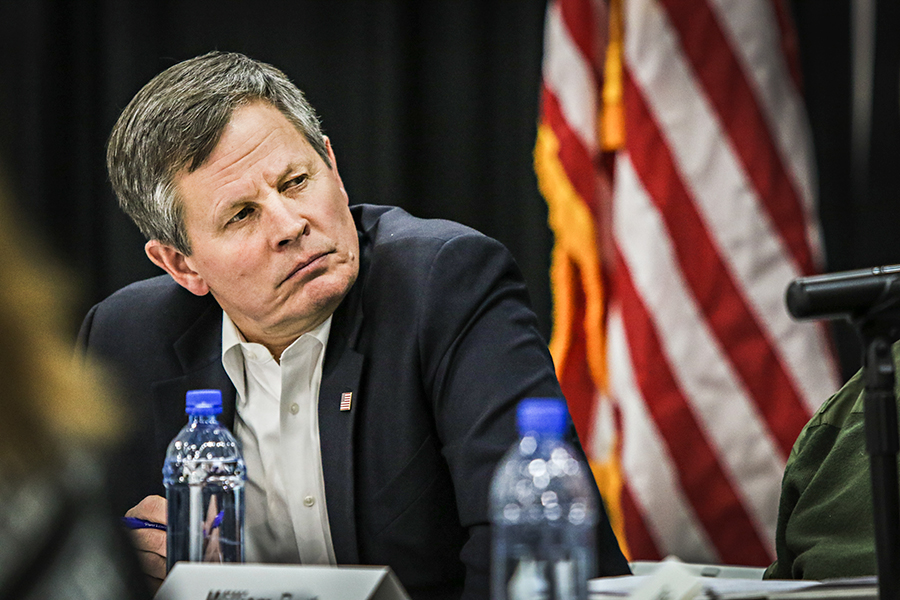Forest Management Bill to Reverse ‘Cottonwood Decision’ Clears Senate Committee
Sponsored by U.S. Sen. Steve Daines and supported by Montana’s congressional delegation, proponents of the measure say it would remove roadblocks to responsible timber management
By Tristan Scott
Billed by Montana’s congressional delegation as a top forest-management priority, a measure to roll back a federal appellate court ruling known as the “Cottonwood Decision” has advanced through a key U.S. Senate committee, signaling a potential reversal of the 2015 mandate that critics say has had a chilling effect on dozens of timber projects that would improve the health of national forests.
Proponents of Cottonwood, meanwhile, insist it promotes an enhanced degree of environmental analysis necessary on a landscape reeling from the transformative effects of climate change, including spiking rates of extreme wildfire and drought in protected wildlife habitat.
As a result of the Cottonwood ruling, the U.S. Forest Service (USFS) has been required to reinitiate consultation with the U.S. Fish and Wildlife Service (FWS) on completed forest plans in national forests inhabited by Canada lynx, prompting some federal courts to halt timber projects during the consultation phase, including several in northwest Montana. Critics of the decision say it creates a never-ending analysis loophole leveraged by “fringe” environmental groups, effectively setting a litigation trap for federal land management agencies.
Sponsored by U.S. Sen. Steve Daines, R-Montana, the new legislative measure (S. 2561) to reverse the Cottonwood decision passed out of the U.S. Senate Committee on Energy and Natural Resources on July 21 with a bipartisan 16-4 vote. The bill is supported by Montana’s entire congressional delegation and by Committee Chair Joe Manchin, D-West Virginia, as well as stakeholders ranging from sportsmen groups to leaders in the local wood products industry.
Speaking to committee members during the hearing, Daines said both the Obama and Trump administrations previously attempted and failed to solve the Cottonwood issue, and that his legislation provides a permanent commonsense fix.
“My bipartisan bill would put an end to a procedural loophole being abused by fringe groups in the courts to block important forest restoration work that is critical for what I like to call the 4 W’s: reducing wildfire, protecting wildlife, improving watersheds, and supporting workers,” Daines said, adding that the 2015 decision “set a new never-ending requirement for consultation on plans that has diverted agency resources and time.”
The Cottonwood ruling by the U.S. 9th Circuit Court of Appeals, named after the Bozeman-based Cottonwood Environmental Law Center that prevailed in the case, requires the USFS to review its forest management plans and consult with FWS whenever a new species is listed under the Endangered Species Act, or when new critical habitat is designated, or when significant “new information” about a listed species became available.
Proponents of Cottonwood say it quite reasonably requires land management agencies to consider new information about harm occurring to endangered species on public lands that are being transformed by drought and extreme forest fires — and that “new information” is the new norm in today’s warming world.
“Prohibiting our land-management agencies from considering climate impacts that are ravaging our public lands is disgraceful and will drive species extinct,” according to a statement from Brett Hartl, government affairs director at the Center for Biological Diversity. “Just days after Senator Manchin killed climate legislation in Congress, he’s doubling down, trying to codify climate denial into law.”
Support for overturning Cottonwood has been broad, however, and includes loggers and sportsmen groups who complain the appellate court ruling has stymied forest management on public lands.
“We need to return the decision-making process to the ‘on the ground’ professionals who have the local knowledge and scientific foundations to best implement good forest management,” according to Paul McKenzie, vice president and general manager of F.H. Stoltze Land and Lumber, which is based in Columbia Falls. “This bill will help alleviate the procedural and litigation grid lock of the past decade, which continually endangers the health and productivity of our public lands and adjoining communities.”
Gordy Sanders, resource manager for Pyramid Mountain Lumber based in Seeley Lake, echoed McKenzie, saying the legislation benefits rural communities and their forest resources.
“The endless delays in court and delays in process put more communities at risk from wildfires and further reduces forest health due to insect and disease infestations,” Sanders said in a prepared statement.
According to the Montana Chapter of Backcountry Hunters and Anglers, the legislation would fix a decision that has “delayed and derailed the ability to complete forestry management activities including projects to enhance wildlife habitat and hunting opportunities.”